These Historic Homes in New England Have Been Transformed Into Chic Hotels
How one hospitality brand changed the hotel game in New England, ushering in a new, more modernized wave of bed-and-breakfasts.

Courtesy of Lark Hotels
The sun was just beginning its gradual slide toward the horizon as my sister and I sat, glasses of pinot grigio in hand, by the fire pit of the Cliffside Inn, a Lark Hotel in Newport, Rhode Island. We'd arrived later than expected and had missed the afternoon wine service, but the affable innkeeper, perhaps sensing our road fatigue, had set us up with a tipple anyway. We sank against the cushioned wicker chairs, sipping and talking until firelight cast flickering shadows around us and a pink crescent moon illuminated the broad-shouldered silhouette of the grandly restored Victorian mansion.
This environment of luxurious ease was hard to come by in New England before Lark Hotels opened its first boutique accommodations in 2012. Founder Rob Blood, a Massachusetts native and former Nantucket innkeeper, says, “This is probably too carte blanche, but when we traveled to bed-and-breakfasts, it felt a little dusty, full of doilies and porcelain dolls and canopy beds — like it was more for the host’s pleasure than our pleasure.”
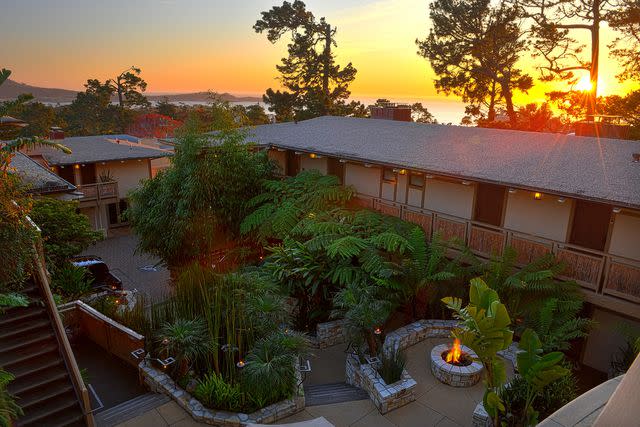
Courtesy of Lark Hotels
At the ripe age of 28, Blood purchased his first hotel property in Kennebunkport, Maine. After learning the "ups and downs, the pancakes, the hospital corners" — and how to treat guests like they were staying in his home — Blood purchased three additional properties. The Lark brand was officially born with the launch of the Attwater in Newport.
Lark is currently celebrating its 10th anniversary. Its portfolio now includes 26 Lark hotels, nine chic motor lodges under sister brand Bluebird by Lark, three nature-immersed retreats under the AWOL shingle, and 16 independently managed hotels. All are in scenic U.S. locations like Newport, Rhode Island; Salem, Massachusetts; Martha's Vineyard, Massachusetts; Block Island, Rhode Island; Portsmouth, New Hampshire; and Portland, Maine, and have a soulful, evocative quality.
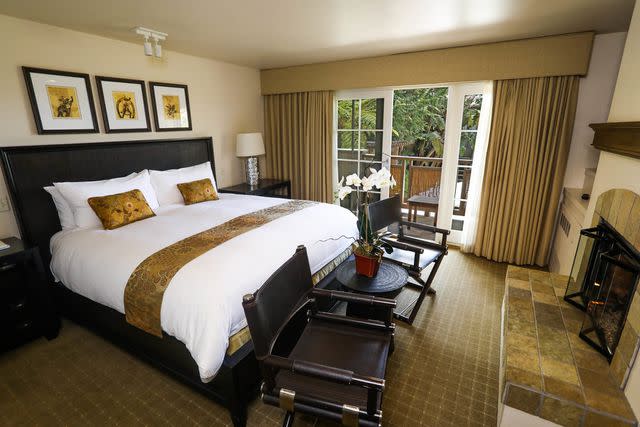
Courtesy of Lark Hotels
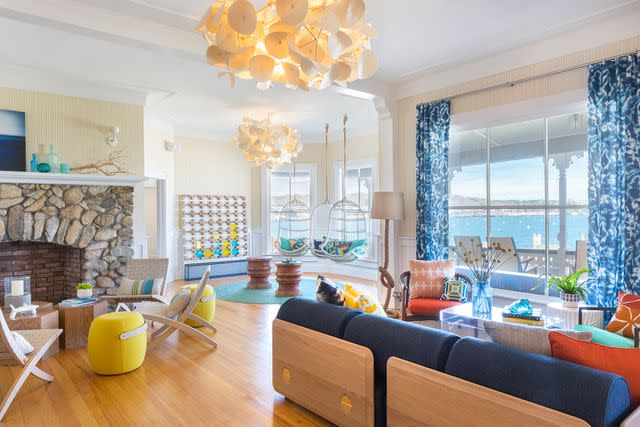
Courtesy of Lark Hotels
For Blood, a self-described "historic home nerd" who lives in an 1803 Federal–style house on the Massachusetts coast, one of the ways Lark has distinguished itself is through the repurposing of historic structures. "The architecture and history become an important part of the story," he says. "It allows us to be in neighborhoods, and that's a really important part of us, as well."
While the buildings are antique, the Lark aesthetic is thoroughly modern, even whimsical. Most rooms feature different designs, and many are awash in bold colors and patterns. Some have additional deluxe touches. For example, our room at the Cliffside, the Lark Suite, had a gas fireplace; a large bathroom with a soaking tub, rainfall showerhead, and Jack-and-Jill sink; and a cushioned window seat overlooking the garden. A mix of vintage and modern furniture pays tribute to the property's history without being mired in it. The overall effect is an unexpected sense of place.
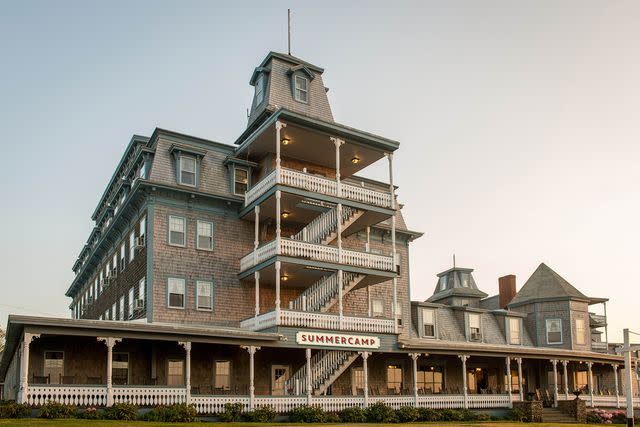
Courtesy of Lark Hotels
Lark’s focuses on comfort by using linens from Boston Textile and Harbor Linens, Serta Pillow Top mattresses, and organic bath products by California brand Lather. While most Lark properties have a 24/7 snack-and-coffee bar in the common area, each offers its own spin on dining as well, from gourmet self-serve breakfast to a full-service restaurant, wine service in the garden, or boxes of local pastries delivered to your door.
Guests who prefer low-contact service can text their innkeeper for information about their stay or recommendations around town. Those who enjoy interpersonal connection will find a friendly face behind the desk — not hovering over their conversations.
“Our guests are all dynamic,” says Tania Pereira, who has served as general manager of Summercamp on Martha’s Vineyard for eight years. “You’re adapting to every person that’s coming to the front desk or calling it, getting a sense of who they are to give them that curated experience.”
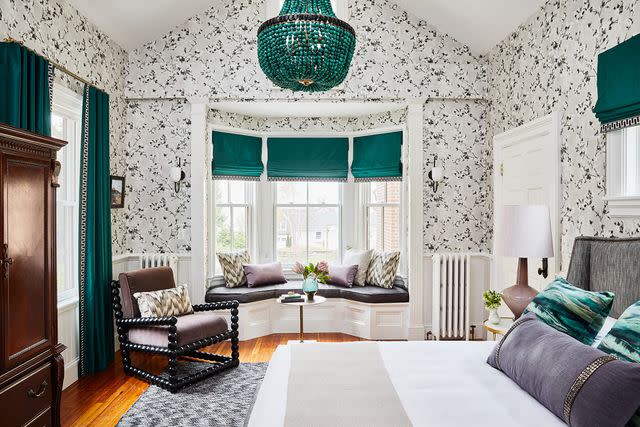
Read McKendree/Courtesy of Lark Hotels

Read McKendree/Courtesy of Lark Hotels
Lark Hotels has grown “in fits and spurts, sustainably and strategically, but also organically,” according to Blood. While they’ve tested the waters outside New England with Tradewinds Carmel, California, since 2020, they chose to stay local while honing their craft. “It takes a while for people in different regions to trust,” Blood says. “While we’re fairly well known in the Northeast, outside it we’re just a couple Yankees who are trying to propagate our hospitality brand.”
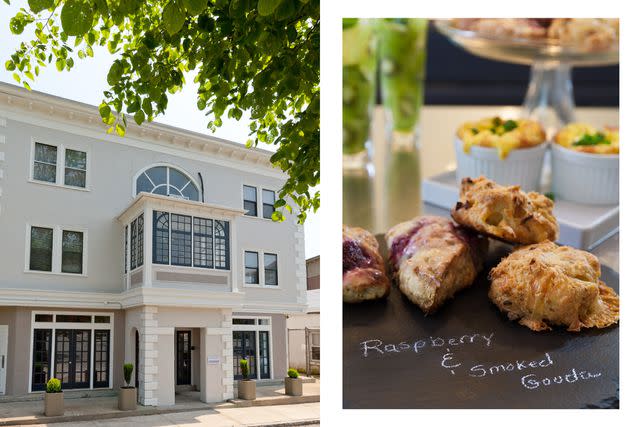
Courtesy of Lark Hotels
To help ease the transition into the Southeast, for example, the hospitality venture started a branch dedicated to managing independent hotels, without the Lark branding. Now that they’ve proven their aptitude, Lark will open eight hotels over the coming year, in locations like New Orleans; Austin, Texas; and Asheville, North Carolina.
Lark’s success has inspired myriad new boutique properties around the Northeast. Blood views the competition as healthy. “When we started out 10 years ago, people thought we were nuts to open small hotels in leisure destinations with no group or corporate business," he says. "We’ve shown that you can have small, soulful properties that are meaningful to people as guests, employees, and owners. Now other people are doing it. I think it’s really broadened the opportunity for travelers to have great independent, curated experiences.”
For more Travel & Leisure news, make sure to sign up for our newsletter!
Read the original article on Travel & Leisure.

